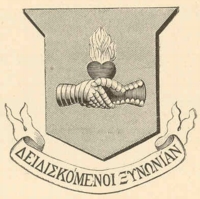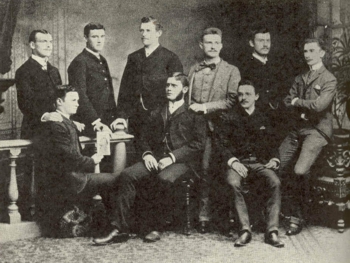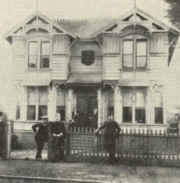The Archives of Phi Gamma Delta
Archives Home Founders Traditions Today in History Historic Sites Leaders Exhibits/References Contact
______________________________________________________________________
Paraphrased from "A Half Century at Berkeley"
The Phi Gamma Delta, Volume 59, Number 2 (November 1936), pp. 171-177
The Establishment of Phi Gamma Delta at California, 1881-1886
by Charles Wade Snook (Berkeley 1913)
Back to History Articles page
 The pioneers of California had in mind the establishment of an institution of higher education, for the first constitution made provision for a state university. A private institution, called the College of California, opened in Oakland in 1860. The legislature established the University of California in 1868. In 1869 the College of California discontinued its instruction, and the University of California opened its doors at the College's Oakland site, in the same year that the first transcontinental railroad was completed. In 1873, the university moved to its present site in Berkeley.
The pioneers of California had in mind the establishment of an institution of higher education, for the first constitution made provision for a state university. A private institution, called the College of California, opened in Oakland in 1860. The legislature established the University of California in 1868. In 1869 the College of California discontinued its instruction, and the University of California opened its doors at the College's Oakland site, in the same year that the first transcontinental railroad was completed. In 1873, the university moved to its present site in Berkeley.
ZETA PSI IS PIONEER
The first college fraternity to make its appearance at the University of California was Zeta Psi, which established there the first Pacific Coast chapter of any national in 1870. Zeta Psi was followed in turn by Phi Delta Theta in 1873, Chi Phi in 1875, Delta Kappa Epsilon in 1876 and Beta Theta Pi in 1879.
Two years later Phi Gamma Delta Planted its first seed in the California soil. The report of the Grand Chapter to the 1881 convention at Point Chautauqua, N.Y., carried the following:
The Committee of the Grand Chapter at a meeting held February 26, 1881, reported favorably upon granting a charter to George F. Schorr, Howard L. Weed, William Bradford, Jr., J. E. Mahan and Robert W. Musgrove, students of California University, Berkeley, California. A charter was accordingly granted, the chapter to be called Gamma, and Brother C. C. Young [Charles Sumner Young] was appointed Legate. As yet no report has been received from the Legate as to the formal organization of the charter, but the petitioners have all become members of Phi Gamma Delta, and the chapter may be considered virtually in existence.
The designation of the chapter as Gamma followed a practice then in vogue of covering tombstones in the roster of chapters by giving them the names of inactive chapters to living ones. The original Gamma had been established in 1850 at the University of Nashville, where it died almost a-borning. Meantime, Gamma Deuteron had been founded at Knox College in 1867.
In the minutes of the 1882 convention at Columbus there appears the following entry in the report of the Grand Chapter:
. . . Of these, Gamma Chapter, the granting of the charter for the establishment of which was noted by the Grand Chapter at the last convention, was organized on the 16th day of August, 1881, and the fraternity is now actively represented on the Pacific Slope.
And The Phi Gamma Delta for February, 1882, carried the following chapter letter from Berkeley:
At last the Phi Gamma Delta has admitted to its mystic circle a small number of Californians. Her standard bearer has reached the shores of the great Pacific, and in sight of its waters has planted his banner over the "classic shades" of Berkeley. Truly, "Westward the course of empire takes its way."
Gamma for the first time rises to announce herself to her Eastern brethren through the columns of the journal, and, like Robinson Crusoe, is patiently awaiting the coming of a ship upon the mast of which floats the flag of the Phi Gamma Delta. We, a small family, eleven in number, for the first time appear upon the rostrum, humbly saluting you, and, metaphorically speaking, extending to you the right hand of fellowship. We feel that although we are far removed from our brethren, the same blue sky covers us and we can recognize each other as children of a common father.
Although we have four secret fraternities in this university, we have succeeded in establishing ourselves with a membership sufficient to secure permanent organization. We fully recognize the responsibility resting upon us a members of this Western chapter, and we will ever strive to fill our place with credit to the fraternity and ourselves. At least, our Eastern brethren must have no fear that their Western friends will disgrace them, for we are determined that our chapter shall surrender its charter for the want of members, rather than take in persons that we may have occasion to be ashamed of.
Our rival fraternities have usually treated us with respect. Only one or two members of a sister fraternity have so far lowered themselves as to make advances toward interfering with our private affairs, and they have done nothing serious. We intend to treat other fraternities with due respect and we have every reason for believing that we shall receive the same. We believe that those working for a like cause ought, if possible, to be at peace with one another.
The new unit, however, was not destined to flourish. Initiations were few and to the 1885 convention in Easton, Pennsylvania, it was reported by the Grand Chapter that "Gamma Chapter has been suffering from internal dissentions during the past year, and it is heartily recommended by the Chief of the Northwest Section that its charter be revoked."
WHOLE STORY OBSCURE
While it is known that there seems to have been some friction over the question of elections to membership in the chapter, the whole story of the unsuccessful career of the chapter is very obscure, particularly in view of the fact that when the present Delta Xi Chapter was established in 1886 its members had very few contacts with the members of the older chapter. The only member of both Gamma and Delta Xi gave this account, according to Edward W. Hill, 1890:
Brother [John H.] Schutte, as explanatory of the final passing out of Gamma Chapter, said that its members became a veritable "mutual admiration society" and could not therefore find among the limited supply of availables (not secured by rival groups) the kind of timber and *quality* to justify acceptance into their most select exclusive body. It must be explained as somewhat of a partial justification, at least, that fraternity life at the period in question had reached a very low ebb. There were but very few students in the Berkeley literary colleges and about the same number in the San Francisco professional group, and, even as late as 1889, Berkeley's enrollment, after 16 years existence, was only about 300--and a motley aggregation, some might unkindly venture to say of us. The North, East, South and West Berkeleys *boasted* 5,000 inhabitants (if you could find them). There was one barber shop with *one* much-coveted chair. We stood in line until--well, until we ultimately learned to shave ourselves.
Schutte entered the university with the class of 1887 and was initiated into Gamma Chapter shortly afterward. When the chapter broke up he left college and took a position teaching school in the San Joaquin Valley.
Morris Baum (Indiana 1877), a practicing attorney in San Francisco, had been Section Chief during the life of Gamma Chapter. In the summer of 1886, Schutte got word from Baum that Albert V. Gear (Denison 1887) was coming to the university. Although he had already made arrangements to continue teaching for another year, Schutte immediately resigned his position and returned to Berkeley, reentering the university and assisting Gear in getting together a group of undergraduates for the purpose of organizing a chapter of Phi Gamma Delta. This action may be understood in the light of one of his fellow charter-members, Thomas D. Allin, 1890, who writes: "Schutte was the most enthusiastic fraternity man that I have ever known."
MEMBER OF BOTH GROUPS
Schutte was loath to comment upon the break-up of Gamma Chapter, so much so that after his death several of his fellow charter-members have insisted that he was not a member of Gamma Chapter, while others claimed that he was. However, there has recently be found a book which all initiates of Delta Xi signed prior to 1917, which has been mislaid during the First World War. It contains, among other things, the signatures of those attending chapter affairs held in San Francisco in the 1880s.
At one affair--headed "Baldwin Hotel Reception of Phi Gamma Delta, July 19, 1888"--he signed "Jno. H. Schutte, Delta Xi and Gamma," and on November 12, 1889, he signed "Jno. H. Schutte, Gamma '87, Delta Xi '89." His membership is further borne out by the fact that he and Gear assisted Baum, who was Legate, in initiating the charter members of Delta Xi.
 THE CHARTER MEMBERS AND THE FIRST INITIATE
THE CHARTER MEMBERS AND THE FIRST INITIATE
Standing: John H. Schutte, '89; Frank Elmer Rich, '90; the first initiate; Thomas D. Allin, '90; Edward Eccleston, '90; Henry A. Fisk, '90.
Seated: Ernest N. Henderson, '90,. Alfred V. Gear, '87; I. I. Brown, '88; Arthur Bachman, '88.
Edward W. Hill, '90, was ill and unable to be present when the picture was taken; his photograph is held by Brother Henderson.
Brothers Gear and Schutte lost no time in gathering together enough men to petition for a charter. Brother Schutte interested I. I. Brown, 1888. They were friends of long standing, both being members of the same high school society, Gamma Delta Kappa, in San Francisco Boy's High School. Brown brought in Arthur Bachman, 1890, a friend of many years in San Francisco. Schutte and Brown had known Edward W. Hill, 1890, in San Francisco for many years and he became interested. Schutte and Hill had known Edward Eccleston, 1890, previously and his name was added. Hill, Eccleston, Ernest N. Henderson 1890, Henry A. Fisk 1890, and Brother Allin all dined at the same lunch club, Henderson and Allin being roommates, as were Hill and Eccleston, and Fisk having been acquainted with Allin before coming to college. Through this association the chapter roll was completed and a petition forwarded to the Grand Chapter. It was speedily granted.
On October 23, 1886, the installation ceremonies were held at Frank's Restaurant on Pine Street in San Francisco. Brother Baum, the Section Chief, bore the expense and acted as Legate.
HILL'S OWN STORY
Brother Hill's flat in Berkeley became the headquarters of the new fraternity. Perhaps we had better let him tell it in his own words:
The writer, preparatory to entering the university, had at the time already furnished a small flat immediately opposite the old Harmon Gymnasium on the U.C. grounds at Allston way, the latter now having been rebuilt on the same spot. This flat, on my acceptance of the offer of affiliation, at once became the meeting place for rushing, charter petitioning and other purposes and, in fact, remained for many months the headquarters of the chapter. while thus in its formative state. Initiations were, of course, held in more formal and pretentious--more impressive, let me say--environments, generally in the showy restaurant banquet halls of San Francisco; then later our first large clubhouse on Dan Street afforded all the setting that such occasions demand.
Brother Allin, I note, has dignified a feature of our early fraternity life by implying that we fostered our mutual good feeling by attendance on a "lunch club." May I throw a little side light on that dietetic feature?
Scene: The combination kitchen and dining room of our flat.
Picture Brother Eccleston on mornings (in his long white night shirt) making mush and coffee and serving his hungry brothers, with Brother Hill sometimes roped in to wipe the dishes and clean up generally.
We two, in a moment of recklessness, had hazarded to venture to board the other Fiji brothers at $14 per month. What's more, the three burner gasoline stove had a tin oven that at intervals (far apart) held a roast; though generally canned goods and innumerable loaves of bread afforded the sustenance of life. The pile of cans in the back yard that year was said to have been somewhat appalling, yet Brother Ed wasn't a bad cook at that. Brother Hill financed the outfit, and out of the profits, and at the expense of the digestions and despite their youthful appetites, Ed and I made our board free.
Meetings, however, were held either at the French restaurants of San Francisco or at the homes of Brown and Bachman. At the end of the first year, with the aid of Brother Baum, the chapter leased a house on Dana Street, between Bancroft and Allston Ways, near the campus. Brother Brown says that "it was a double-house, commodious, and fairly well suited to the needs of the chapter at that time."
 DELTA XI'S FIRST CHAPTER HALL, 1887
DELTA XI'S FIRST CHAPTER HALL, 1887
Left to right: Charles A. Allin 1891; Ernest N. Henderson 1890; John H. White 1891; Edward Eccleston 1890; Fred A. Julliard 1891; Edward W. Hill 1890; Thomas D. Allin 1890.
The house was razed in the early 1930s to make way for the new men's gymnasium. The Greek letters "Phi Gamma Delta" were visible over the doorway, having been blown in glass and gilded. This house was the chapter's home for about eight years, until the boys moved to a more modern house which was built next door. This, in turn, was occupied until 1907, by which time it was so dilapidated that another move had to be made.
MEMBERS ACTIVE ON CAMPUS
The new chapter quickly took its place in the life of the growing university. Of the charter members, Henderson was an honor student in philosophy and associate editor of the "Blue and Gold" campus annual. Schutte and Hill each became manager of that publication. Allin was both a tackle on the football team and a varsity baseball player. Of the early initiates, Elmer Rich, 1890, became associate manger of the "Blue and Gold" and president of his class. John H. White, 1891, was a winning baseball pitcher and captain, as well as a football player. Fred A. Juilliard, 1891, became president of the student body. Phil Weaver, 1891, was a distance winner in track.
Gear was the first president; Hill, the first Treasurer; Schutte, the first secretary. Later Schutte, Brown, Allin and Henderson all succeeded to the Presidency of the chapter and thus became responsible for its early successes and traditions.
A word about the later lives of these members:
- Gear was for many years commissioner of education in the Hawaiian Islands, a position he held until shortly before he died.
- I. I. Brown became a successful attorney in San Francisco.
- Hill established himself in Chicago and became associated with the well-known firm of A. B. Dick Co. as its inventor-in-chief, and until his death in 1928 was an enthusiastic member of the Chicago Graduate Chapter.
- Tom Allin was for many years in public life, having been city engineer, commissioner of streets and mayor of Pasadena. He was later associated in business with his brother, also a member of Delta Xi Chapter.
- Ed Eccleston became a minister, and was for many years pastor of the First Presbyterian Church of Fresno. Later he became a Chautauqua lecturer and Red Cross organizer. During the First World War he was recruiting secretary for the YMCA and later entertainment secretary for the YMCA in France.
- Fisk became a Baptist clergyman, and was for many years vice-president of the College of Idaho. He later moved to Los Angeles and conducted tours of Europe and Asia.
- Bachman was a successful importer, exporter and merchant in San Francisco.
- Henderson, who is mentioned in Frank Norris' "An Exile's Toast," was an educator for many years at Adelphi College in Brooklyn (now Adelphi University).
Other articles relating to Delta Xi at California
Back to History Articles page